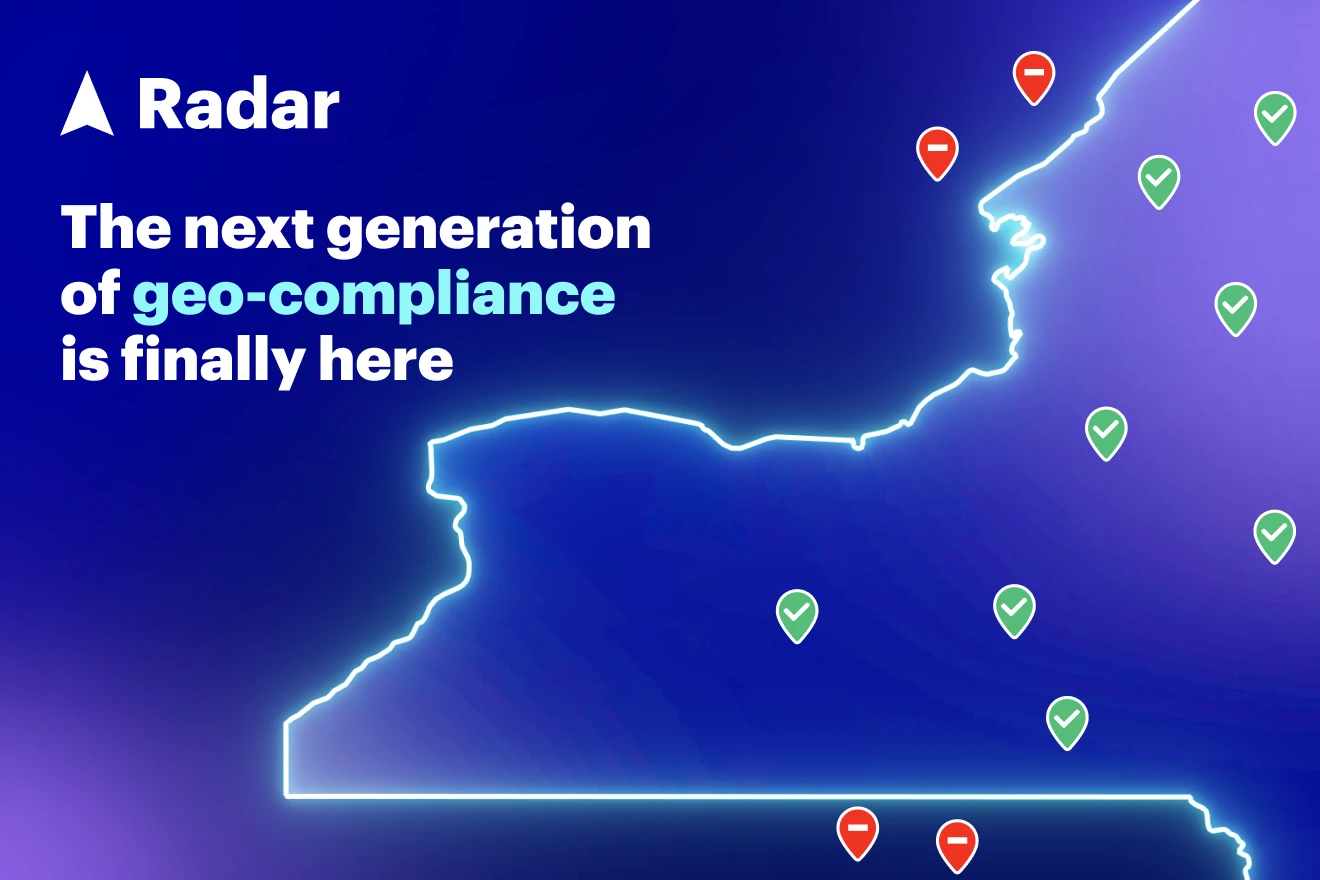Beyond compliance: Reaping the benefits of geolocation services

With complex regulatory requirements, questionable accuracy, and widespread availability of technology that avoids detection (such as VPNs), operators face significant challenges in managing the geolocation access of their customers. Nick Patrick, co-founder and chief executive officer of Radar, believes that a powerful geolocation solution should not only help operators overcome these challenges but also offer them additional benefits.
“Over the past few years, we’ve spoken to hundreds of operators, suppliers, and regulators. Virtually everyone agrees: cost-effective, innovative geolocation alternatives are needed.”
It’s estimated that, in 2024, Europe and North America will account for 40.4% and 21.2% of global igaming gross wins. Unlike offshore online gambling operators that traditionally operated under a remote gaming license, new legislation in established markets like Europe and newer markets like North America requires operators to be regulated by local jurisdictions (e.g., a state, a province, or a country). Meanwhile, one of the strictest license requirements in local jurisdictions is to verify users’ location and block those trying to access the platform from outside the regulated jurisdiction.
The growing need for a reliable, cost-effective geolocation solution fueled the growth of Radar’s customer base. “We support over 200 enterprises globally spanning across gaming, logistics, retail, and more,” says Patrick. “Gaming is our fastest-growing vertical, and today we have nearly 50 enterprise gaming customers spanning sportsbook, igaming, ilottery, DFS, horse racing, and more. We support all shapes and sizes of operators, from large US-based operators to small startups.”
But beyond a cost-effective, robust location-detection solution, Radar’s platform provides its customers with a plethora of additional services, such as powerful fraud detection and player engagement tools.
Being aware of potential geolocation benefits
One of the main challenges operators face is integrating a costly geolocation solution into their platform. Many operators assume a standard geolocation solution is necessary just to comply with regulations, being unaware of the additional benefits and value they can extract from a powerful geolocation platform that offers more than just the standard.
“In gaming, large operators are spending 6, 7, or even 8 figures on geolocation, and generally all they’re getting is compliance,” says Patrick. “They’re looking for a more cost-effective solution that’s also more flexible, one that makes it possible to collect more geolocation data for better intelligence and fraud detection, and that makes it possible to enable new use cases like on-premise or in-venue app experiences and messaging.”
Another way Radar looks to decrease costs is by boosting the efficiency of smartphone location services and implementing a location infrastructure that improves its prices. Customers get more value for money with this geolocation technology, as it also provides fraud detection and player engagement options.
Achieving accuracy and reliability
Regulatory requirements make the accuracy of a player’s location crucial. In some cases, an operator needs to verify that a player is physically located within a few meters of borders or even buildings. For example, as US gambling regulations vary between states, device users must be able to verify they are physically located within state borders to use a respective gambling app.
Poor tracking can result in lagging speeds and a frustrating, underwhelming user experience. In some cases, it can cause revenue losses due to wrong location-based blocking or expose the operator to a legal breach if it fails to detect and block access from outside the jurisdiction.
Patrick explains how Radar negates these challenges: “We’ve gotten great feedback from operators about Radar’s accuracy (generally down to a few meters, works great near state borders), latency (generally a second or two per geolocation check, inclusive of location services and API calls), and pass rate (generally greater than 99%).
“And because we price based on monthly tracked users, not location pings, we can check more frequently than needed at no additional cost to operators, ensuring that we always have a fresh geolocation token available with zero latency.”
Complying with complex regulations
Many gaming jurisdictions have strict regulations that require accurate geolocation for proper enforcement. For example, every US state has different rules for online sports betting and casino gambling. In Louisiana, sports betting is legalised parish-by-parish, meaning you can play in Grant but not across parish lines in Winn. If you travel to the neighbouring state of Mississippi, online sports betting is only permitted on the grounds of licensed casinos. To track which state you are in and what region to comply with, geolocation requirements require high accuracy.
It’s not just the US that faces tricky geolocation restrictions. Many European and Latin American jurisdictions also require players to comply with geolocation requirements. For example, Brazil plans to introduce a state-by-state restriction similar to that of the US.
Patrick explains how Radar can help operators comply with several compliance requirements at once: “Our Geolocation Compliance solution is an extension of our Geofencing Platform, with everything that licensed operators need to satisfy geolocation requirements in regulated jurisdictions out-of-the-box, such as state-specific exclusion zones (e.g., excluded parishes in Louisiana or tribal areas in Arizona) and state-specific requirements for geolocation checks (e.g., required spoofing checks or required intervals depending on distance to start border).”
Achieving location-based engagement
Most geolocation platforms offer no more than location-detection services. Cumbersome technology and expensive costs prevent operators from extracting additional value from players’ location and data gathered. However, Patrick sees past the challenge, envisioning an opportunity to create an entirely new paradigm of location-based engagement.
“Because geolocation solutions are so expensive and so limited currently, geolocation is somewhat underutilised in the gaming space. Operators are using geolocation for compliance and not much more. With more flexible, cost-effective geolocation solutions, operators could be using geolocation for on-premise and in-venue app experiences and messaging.
“Imagine an app experience that changes when you’re at a live sporting event or imagine your app unlocking offers or sending engaging notifications when you walk into a casino.”
He also talks about leveraging the company’s knowledge from other industries. “Radar has long powered similar use cases for brick-and-mortar brands like Panera, DICK’S Sporting Goods, and T-Mobile, and we’re excited to unlock some of that innovation in the gaming space as well.”
Detecting and combatting fraud
Geolocation services must constantly battle malicious intentions, such as users taking action to try to commit location fraud. “Fraud is a big focal point in the industry at present”, says Patrick. “Radar detects dozens of types of location-based fraud, including the detection of GPS spoofing, proxy and VPN usage, jumping detection, rooting and jailbreaking detection, and much more.”
Referring to the additional value operators can extract, he adds: “For regulated operators, many of these checks are mandated by state geolocation requirements. But they’re also important to helping operators stop fraud rings, account takeover, proxy wagering, bonus abuse, and so on.”
Overcoming technical complexities
Developing a gaming platform is time-consuming and challenging enough, but incorporating and maintaining the tech aspects of a geolocation service makes it harder. To make things even more difficult, many igaming operators have to turn to geolocation platforms that are not customised to their requirements.
Patrick shares how Radar addresses these pains: “Radar’s developer-friendliness is unique among geo-compliance solutions. We’re the only geo-compliance solution with open developer docs, open-source SDKs [Software Development Kits], and self-serve signup. This is a breath of fresh air for product and engineering teams in the gaming space.
“Because we’ve spent the last 8 years building the world’s best geofencing infrastructure, from SDKs to dashboards to developer documentation, it gives us something of an unfair advantage in the gaming space,” he adds.
Taking client feedback onboard
Radar relies heavily on its customers’ feedback to continue providing a usable, developer-friendly geolocation solution that really delivers. Patrick shares how listening to customers is the company’s ethos: “As mentioned above, we’ve gotten great feedback on our performance: accuracy, pass rates, latency, and so on. But we’ve been most pleasantly surprised by feedback about our back office. One US igaming operator recently called our dashboard “far superior” to their previous solution.”
Patrick explains that Radar constantly measures itself against strict standards: “We focus on what operators look at. They generally look at pass rates (what % of geolocation checks are succeeding?), false positive rate (what % of geolocation checks are failing that shouldn’t have?), false negative rate (what % of geolocation checks are passing that shouldn’t have?), latency (how fast are geolocation checks?), and system uptime.”
Enabling operators to detect their players’ location remains at the heart of Radar’s solution. But unlike other geolocation solutions that provide nothing more, Radar uses its geolocation technology as a foundation for giving igaming operators additional value. “Reporting, analysis, and alerting is a big product focus for us this quarter,” he says. “And we’ll have some exciting product announcements to share very soon.”
